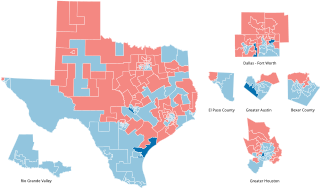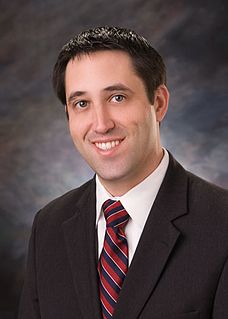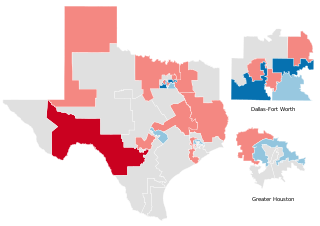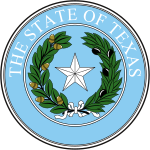
The 2008 United States Senate elections were held on November 4, 2008, with 35 of the 100 seats in the Senate being contested. Thirty-three seats were up for regular elections; the winners were eligible to serve six-year terms from January 3, 2009 to January 3, 2015, as members of Class 2. There were also two special elections, the winners of those seats would finish the terms that ended January 3, 2013.

The 2010 United States Senate elections were held on November 2, 2010, from among the United States Senate's 100 seats. A special election was held January 19, 2010 for a mid-term vacancy in Massachusetts. Thirty-four of the November elections were for six-year terms to the Senate's Class 3, while other three were special elections to finish incomplete terms. Those 37 November elections featured 19 incumbent Democrats and 18 incumbent Republicans.

The 2006 Texas gubernatorial election was held on November 7, 2006, to elect the Governor of Texas. The election was a rare five-way race, with incumbent Republican Governor Rick Perry running for re-election against Democrat Chris Bell and Independents Carole Keeton Strayhorn and Kinky Friedman, as well as Libertarian nominee James Werner. Perry was re-elected to a second full term in office, winning 39% of the vote to Bell's 30%, Strayhorn's 18% and Friedman's 12%.
District 1 of the Texas Senate is a senatorial district that serves all of Bowie, Camp, Cass, Franklin, Gregg, Harrison, Lamar, Marion, Morris, Panola, Red River, Rusk, Titus, Upshur, Wood and Smith counties in the U.S. state of Texas. The current Senator from District 1 is Bryan Hughes.

Kirk Preston Watson is an American attorney and politician from Austin, Texas. A member of the Democratic Party, he served as Mayor of Austin from 1997 to 2001. He ran unsuccessfully for Texas Attorney General in the 2002 election, when he was defeated by Republican Greg Abbott, later governor of Texas. In 2006, Watson was elected to the Texas Senate from District 14.

The 2006 Texas Legislature election was held on Tuesday, November 7, 2006, in the U.S. state of Texas. The Texas Legislature election was conducted as a part of the 2006 Texas general election, which also included the 2006 United States Senate election in Texas, the 2006 United States House of Representatives elections in Texas, and the 2006 Texas gubernatorial election.
Barry Kip Averitt is an American politician who served as a member of the Texas Senate from the 22nd District from 2002 to 2010.

Glenn Allen Hegar Jr. is an American attorney who serves as Texas Comptroller of Public Accounts. He was a Republican member of the Texas Senate representing the 18th District, west of Houston. He succeeded fellow Republican Susan Combs as comptroller on January 2, 2015. He was elected Comptroller in the general election on November 4, 2014.

2008 elections for the Texas Legislature were held on Tuesday, November 4, 2008, in the U.S. state of Texas. The Texas Legislature election was conducted concurrently with the election for the 2008 United States presidential race, the United States Senate seat of Republican John Cornyn, and the state's 32 congressional representatives.
The following table indicates the party of elected officials in the U.S. state of Texas:

The 1993 United States Senate special election in Texas was held on June 6, 1993, to replace Democratic U.S. Senator Lloyd Bentsen, who had resigned to become Secretary of the Treasury. Governor Ann Richards appointed Democrat Bob Krueger, a Texas Railroad Commissioner, to fill the seat. Krueger ran in the special election, but was defeated in a landslide by Republican Kay Bailey Hutchison. Hutchison was the first Republican to win this seat since Reconstruction. In 2010, Krueger's campaign was named by the Houston Chronicle as the worst in Texas' modern political history.
Brian D. Birdwell is an American politician who has served in the Texas Senate for District 22 since 2010. He is a survivor of the September 11, 2001 attacks against The Pentagon.

The 2014 United States Senate election in Texas was held on November 4, 2014, to elect a member of the United States Senate. Incumbent Republican senator and Senate Minority Whip John Cornyn ran for re-election to a third term. Primary elections were held on March 4, 2014. Since no Democratic candidate received over 50% in the first round of the primary, a runoff election was required on May 27, 2014. David Alameel, who came in first in the primary, won the runoff and became his party's nominee. In the general election, Cornyn defeated Alameel in a landslide.
Drew Alan Springer Jr. is an American businessman and politician serving as a Republican member of the Texas Senate who represents District 30.

The 2020 United States Senate elections were held on November 3, 2020, with the 33 class 2 seats of the Senate contested in regular elections. Of these, 21 were held by Republicans, and 12 by Democrats. The winners were elected to six-year terms from January 3, 2021, to January 3, 2027. Two special elections for seats held by Republicans were also held in conjunction with the general elections: one in Arizona, to fill the vacancy created by John McCain's death in 2018; and one in Georgia, following Johnny Isakson's resignation in 2019. In both races, the appointed incumbent Republicans lost to Democrats. These elections ran concurrently with the 2020 United States presidential election in which incumbent Republican president Donald Trump lost to Democratic nominee Joe Biden.

The 2020 United States House of Representatives elections were held on November 3, 2020, to elect representatives from all 435 congressional districts across each of the 50 U.S. states, as well as six non-voting delegates from the District of Columbia and the inhabited U.S. territories. Special House elections were also held on various dates throughout 2020.

The 1922 United States Senate election in Texas was held on November 7, 1922. Incumbent Democratic U.S. Senator Charles Culberson ran for re-election to a fifth term, but lost the Democratic primary. A runoff between former Governor Pa Ferguson and Railroads Commissioner Earle Bradford Mayfield.

The 2018 Texas State Senate elections took place as part of the biennial United States elections. Texas voters elected state senators in 15 of the state senate's 31 districts. State senators serve four-year terms in the Texas State Senate. A statewide map of Texas's state Senate districts can be obtained from the Texas Legislative Council here, and individual district maps can be obtained from the U.S. Census here.

The 2020 Texas State Senate elections took place as part of the biennial United States elections. Texas voters elected state senators in 16 of the 31 state senate districts. State senators serve four-year terms in the Texas State Senate. Those elected in 2020 will only be elected for two years, however, as part of the 2-4-4 term system. A statewide map of Texas's state Senate districts can be obtained from the Texas Legislative Council. and individual district maps can be obtained from the U.S. Census.

The 2021 Texas's 6th congressional district special election was held on May 1, 2021. The seat became vacant after incumbent Republican Ron Wright died on February 7 of COVID-19.
















